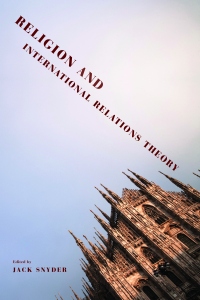Jack Snyder (Columbia University)
Since September 11, 2001, religion has become a central topic in discussions about international politics. And yet the standard works of US international relations theory, which continue to shape much academic research, hardly mention religion. A handful of new works by young US international relations scholars have begun to fill this gap. The best of this new work is represented in Religion and International Relations Theory, edited by Jack Snyder, forthcoming from Columbia University Press in March 2011. Snyder’s overview of the project will focus on four approaches to integrating religion into theoretically-grounded international relations scholarship: (1) working within the traditional US paradigms of realism, liberalism, and social constructivism, (2) supplanting existing paradigms with a religion-centered theory, such as the “clash of civilizations” thesis, (3) analyzing secularisms as worldviews comparable to religions, and (4) treating religion as a variable in testable hypotheses about the causes of conflict international relations.
Discussant: Denis Lacorne (CERI)
CERI – Salle de conférences 5pm – 7pm
